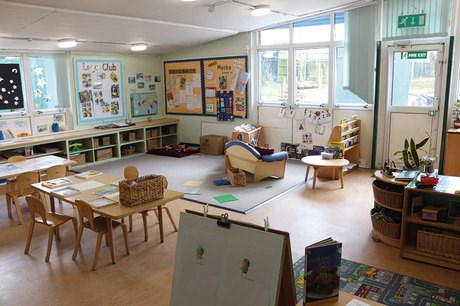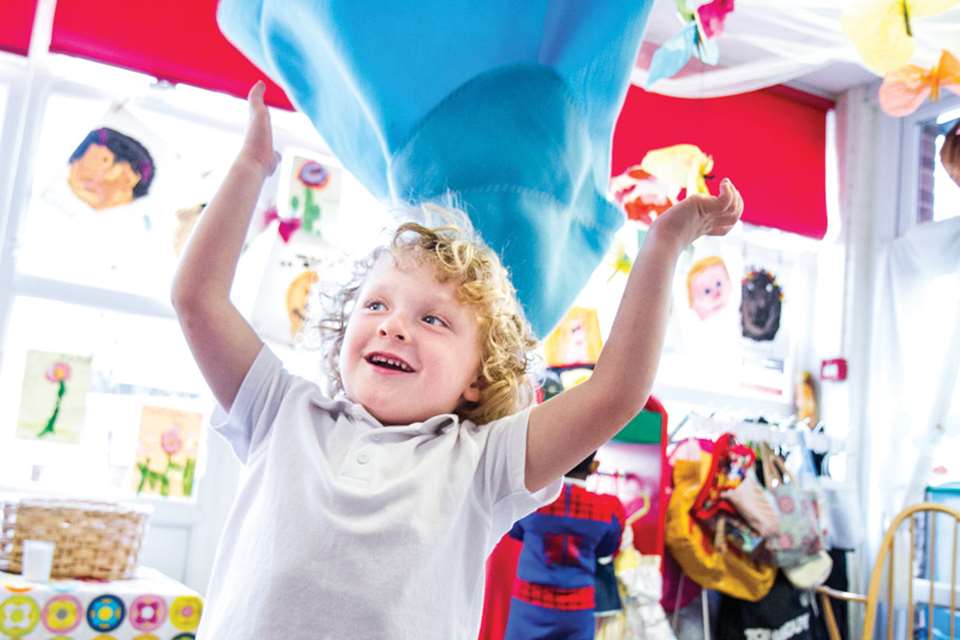Positive Relationships: Nurture - A fresh start
Caroline Vollans
Monday, June 26, 2017
Children struggling in Reception and Year 1 with behavioural and emotional problems are being helped to become more confident learners at a specialist centre in Everton. By Caroline Vollans

What can be done to help those children who leave their early years setting and then struggle in Reception and Year 1? In 2015, an innovative and alternative provision for such children was opened by Everton Nursery School and Children’s Centre.
It grew out of a prevailing need recognised by several local primary schools: many children in Reception and Year 1 were not having a good experience. Such children would be likely to face exclusion very early on in their school life. As a means of addressing this critical need and avoiding potential disaffection at such an early age, the Everton Centre for Nurture was established.
Everton head teacher Dr Lesley Curtis OBE explains, ‘It was thought that the nurturing environment we provide in the nursery would be appropriate for those children found to be struggling at school. We could offer them a responsive setting and bespoke curriculum. It was also a chance for the staff in the schools to benefit from our expertise and knowledge in the early years.’
The nine-place provision is commissioned by a consortium of 16 local primary schools, which pay for their children to attend. The children are dual registered – at their school and at the centre. The consortium employs an educational psychologist who leads the continued development of the centre and staff training and works with the SENCO, the schools and the centre to identify children suitable for a place.
Currently the majority of referrals are due to complex behaviour and emotional disturbances that are difficult to contain and respond to in the large primary classroom – most referrals have been boys. These more challenging behaviours can be worked with and managed more satisfactorily in the nurture setting where there is a three to one adult:child ratio – one of the adults being a teacher.
ETHOS AND AIMS
The fundamental aim is to give children a positive start to their school life and enable them to foster a belief in themselves as learners. The children and families are offered an environment where they can both be supported with their behaviour and given the opportunity to learn in a way that is meaningful to them – children have to go to school for a long time, and if they get off to a poor start it does not bode well.
‘Families and children are at the heart of all we do,’ says Dr Curtis. ‘Carers are a co-component of all our work with children. A key emphasis of the work is encouraging carers to gain an awareness and understanding of what it is to learn and the huge variety of ways in which children can learn.’
Families are welcomed to Terrific Tuesdays and Fun Fridays where ‘staff engage with the families and children in high-quality learning opportunities both in and outdoors’. The wealth of learning that can be achieved through activities using sand, water, insects or bikes is demonstrated and given status. It is not all about sitting at a desk and failing to write their name, repeatedly.
The bespoke curriculum is based on the premise of being attuned to the individual child’s interests and fascinations. ‘Whether it is superheroes, water, planes, cars or trains that capture their attention, this is where the curriculum planning starts,’ says Dr Curtis. That is not to say that phonics, writing, reading is not given a high profile, ‘we just come at it differently and creatively’.
BESPOKE CURRICULUM
The day begins with massage led by the teacher to help the children begin the day calmly. Each child then pursues the rest of the day according to their individual programme with their specific intervention strategies running throughout.
Lego Therapy is one of the key activities. A structured therapeutic tool, it is designed to help children who experience social or communication problems. Dr Curtis explains, ‘There are countless aspects to playing with Lego that are of lasting benefit – dexterity and fine motor skills, work on space and shape, turn-taking, occupying various roles (building director, manager and so on), waiting to be given directions, following instructions, speaking and listening to each other. If it’s going to work, the children have to learn to engage in all of these.’
Music is another curricular area that proves to be incredibly successful in engaging the children. Everton Nursery School is, in fact, the only one in the country to be designated an In Harmony school – musicians from the Philharmonic Orchestra work with the children and families. ‘One particular child with an autistic spectrum disorder has really taken off – he concentrates so well and is able to read music and play the violin,’ says Dr Curtis. ‘This is a good example of how a bespoke curriculum is invaluable.’
The curriculum centres on lively and meaningful activities throughout the day. There is woodwork where the children make things for a purpose (such as bird boxes, robots, wind turbines and railway stations) using real tools and equipment. There is a Forest School on site with its own outdoor classroom and log cabin. There is also a garden in which work with insects and wildlife happens.
PARADIGM SHIFT
At the moment, the children join for any number of terms, up to six. Some come for just one term, and others for the full six. They then make a transition back to their mainstream school or, if the need is assessed as such, to a specialist provision. Again, how this is done is specific to each child with their own transition plan involving the child, the carers, the SENCOs from both schools and the class teachers.
The plan is to extend this provision for older children and open a Free School for Year 2 and Key Stage 2 children based on the model at the Centre for Nurture. Again, this would be an alternative provision for vulnerable primary-aged children with social and emotional difficulties for whom mainstream education is not resourced adequately.
‘Our intention is to provide a paradigm shift in alternative provision,’ says Dr Curtis. ‘We purposefully use the word nurture in our school name as we believe many of the children need to build reciprocally nurturing and attuned relationships with both peers and adults. For a significant number of children, relationships at every level have broken down, leaving them feeling damaged, worthless and alone. We intend to provide more than intellectual excellence, demonstrating personal compassion and modelling the joy of positive co-existence. In this way, we believe children will be enabled to reconnect with themselves through better resilience and self-regulation in ways that make them feel safe, significant and able to learn.’
The need for this intervention does not stop at Reception and Year 1 – many children will have nurturing and emotional needs at various points in their school careers. But the evidence from developmental psychology and neuroscience is clearly indicating that the birth-to-five phase of life is a highly sensitive period for emotional development. By helping children at this important stage, the Everton Centre for Nurture is helping young children to overcome a temporary vulnerability in their development, rather than risk getting stuck in a cycle of difficulty, failure and exclusion.
MORE INFORMATION






